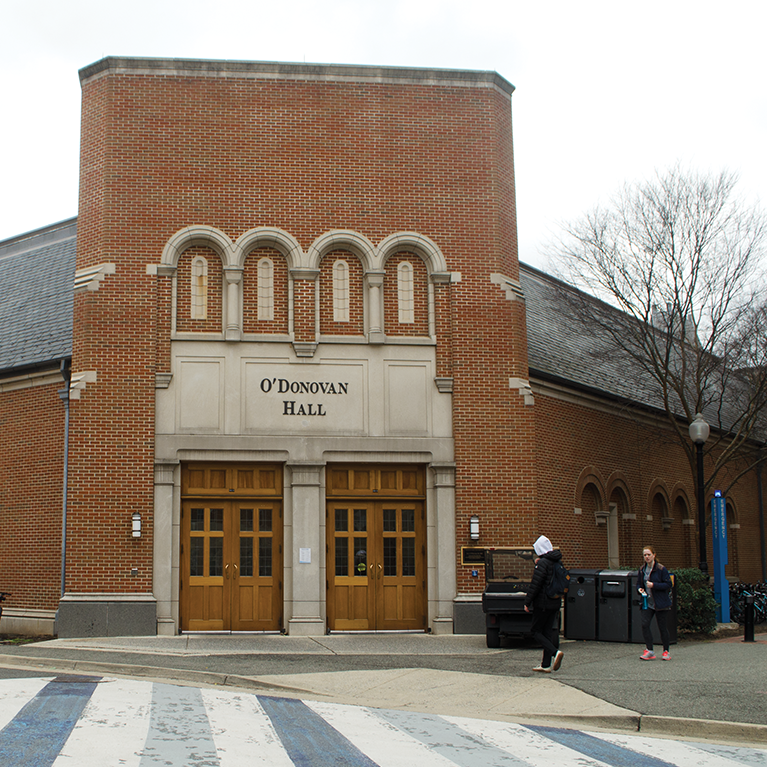Georgetown staff members discussed on March 1 upcoming contract negotiations and changes to working conditions since the COVID-19 pandemic at a Georgetown Coalition for Workers’ Rights (GCWR) panel discussion.
The event, entitled “A Community Conversation on Workers’ Justice,” hosted three Georgetown employees: Jackie, an overnight shift employee in the custodial department; José, a heating and air conditioning technician for facilities management; and D’Ante, a worker in Leo O’Donovan Dining Hall. The trio, granted last name anonymity in The Hoya’s publication for safety purposes, explored changes in Georgetown’s working environment since March 2020. Professor James Benton of Georgetown’s Kalmanovitz Initiative for Labor and the Working Poor, which connects students to workers and local advocacy groups, moderated the event.
Georgetown has seen changes in management, attrition of employees, replacement of full-time staff with temporary employees, changes in shifts and a general lack of respect for workers since the pandemic began, according to the panelists.
José, who has been working for Georgetown for 28 years, said that during the pandemic, many of his coworkers retired or left. José said the administration has not replaced those positions.
José said that before the pandemic when his children attended Georgetown, there were approximately 30 mechanics in his shop, but now only five mechanics cover the whole campus — creating a low quality of service incompatible with Georgetown’s price and the care facilities teams put into their work, José said.
“I make sure you guys stay in the wintertime with heating and in the summertime, cooling. I worry about you guys the same I did about my daughter and son. It is not fair you guys pay a lot of money here, this is not a cheap university, and for the kind of service you guys receive, it is not fair,” José said at the event. “Georgetown needs to hire more air conditioning technicians to serve you better.”

D’Ante, who has worked at Georgetown for 26 years, said Hoya Hospitality, the university’s dining service, also lost many workers during the pandemic that they did not rehire.
Jackie said the administration began contracting facilities work to external companies after the pandemic, reducing housekeepers’ available overtime work and available break space.
“I’m too old to be walking around at 2:00 and 3:00 in the morning to sit and find a place for lunch,” Jackie added. “I hope that in the future, with this gathering, not only will things go back to the way they were, but get better.”
While facilities workers negotiated new contracts last summer, dining workers’ contracts expire at the end of this year. D’Ante said the promise of a new contract offers some hope for change.
“This year, since our contract is ending, and I’ve been on the negotiation team since 2012, I’m tired of letting the company wipe crumbs off the table and letting us fight for it,” D’Ante said.
The panelists also discussed their experiences with racial discrimination from both students and management. For example, D’Ante said a supervisor once told a fellow Leo’s worker that he could shine their shoes if the employee had nothing else to do for the day.
Alexis Harper, director of communications at the Kalmanovitz Initiative, said these stories of discrimination and disrespect resonate on a personal level with her as an African American woman.
“These people become your second set of parents that root for you like your family, too. You feel like you’re going to school for them, too,” Harper told The Hoya. “When I hear them speak, I don’t hear people in low level or so called unskilled labor, I hear my working class aunts and uncles and cousins speaking.”
The panelists said students are crucial in efforts to better working conditions, whether by advocating for workers with the administration or simply interacting with University staff.
D’Ante said strong relationships between students and staff have allowed for change in working conditions in the past.
“Since I’ve been here, I’ve seen what the students can do, I saw what they did, and I think that during the pandemic we lost a little bit, all of us did,” D’Ante said. “It’s time to stand back up, fight again, and let them know that y’all need us.”
A university spokesperson said that Georgetown aims to create a positive atmosphere for staff and will investigate any report of discrimination or retaliation.
“We deeply appreciate the contributions that University staff and contracted workers make to the Georgetown community. Georgetown is committed to respecting the dignity of all members of our community,” the spokesperson wrote to The Hoya. “Georgetown strives to be a community in which all members live and work in an atmosphere free from discrimination and retaliation.”
Madison Allen (CAS ’25), events coordinator for GCWR, said the best way to make progress in working conditions is through student-worker solidarity.
“While the GCWR does utilize institutional pathways to advocate for workers, those pathways were designed by and for administrators, not workers. Thus, student organizing is required,” Allen told The Hoya. “It is through public organizing that we can best bring attention to issues that workers face and successfully advocate for them.”
Allen said small gestures of kindness should be the norm when talking to Georgetown employees.
“A big part of supporting University staff everyday can be saying hello to workers and asking them how they’ve been — in other words, by seeing them, rather than ignoring workers as if they don’t exist,” Allen told The Hoya. “Talking with workers is a big part of building relationships.”
Harper and Allen, as well as the panelists represented at the event, said they have hope that a strong relationship between student and staff can pave the way for change in the future. “At the end of the day, the university is its students,” Harper said. “You are the ones who attend class every day and participate in sports and conferences under the university banner. Georgetown needs all of you, workers and students.”




















